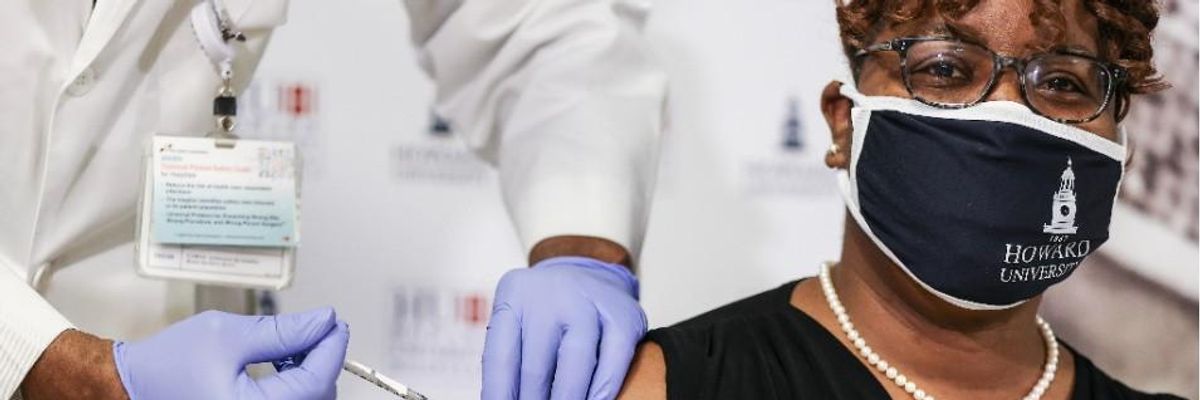
Howard University Hospital staff members received Covid-19 vaccination doses on December 15, 2020 in Washington, D.C. (Photo: Tasos Katopodis/Getty Images)
To donate by check, phone, or other method, see our More Ways to Give page.

Howard University Hospital staff members received Covid-19 vaccination doses on December 15, 2020 in Washington, D.C. (Photo: Tasos Katopodis/Getty Images)
Just over a year ago, the world looked on in shock as the Chinese city of Wuhan imposed the first coronavirus lockdown. Since then, people around the world have made extraordinary sacrifices and have shown great solidarity in containing the spread of the virus.
Yet, when it comes to rolling out vaccines, the world's political leaders seem to have forgotten that we are all in it together.
The European Union has in recent weeks been engaged in a dispute with vaccine makers after AstraZeneca admitted it was expecting a major shortfall in production, and has been accused of prioritizing deliveries to the UK. In response, European officials have introduced temporary export restrictions on vaccines produced in its territories, giving member states the option of limiting exports outside the EU to countries like the UK, the United States and even South Africa.
Rich countries have ordered enough doses to vaccinate their populations three times over, while 9 in 10 people in nearly 70 poorer countries are unlikely to be vaccinated at all this year. This is according to analysis in December 2020 by the People's Vaccine Alliance, a group of organizations including Amnesty International campaigning for free and fair distribution of vaccines.
The situation in South Africa underscores exactly why the world can't afford to engage in this everyone-for-themselves approach. As new variants of Covid-19 emerge, including a new strain identified by South African scientists that appears to be more contagious than the original strain, the stakes have become even higher for ensuring rapid and equitable delivery of vaccines.
Trump and Musk are on an unconstitutional rampage, aiming for virtually every corner of the federal government. These two right-wing billionaires are targeting nurses, scientists, teachers, daycare providers, judges, veterans, air traffic controllers, and nuclear safety inspectors. No one is safe. The food stamps program, Social Security, Medicare, and Medicaid are next. It’s an unprecedented disaster and a five-alarm fire, but there will be a reckoning. The people did not vote for this. The American people do not want this dystopian hellscape that hides behind claims of “efficiency.” Still, in reality, it is all a giveaway to corporate interests and the libertarian dreams of far-right oligarchs like Musk. Common Dreams is playing a vital role by reporting day and night on this orgy of corruption and greed, as well as what everyday people can do to organize and fight back. As a people-powered nonprofit news outlet, we cover issues the corporate media never will, but we can only continue with our readers’ support. |
Just over a year ago, the world looked on in shock as the Chinese city of Wuhan imposed the first coronavirus lockdown. Since then, people around the world have made extraordinary sacrifices and have shown great solidarity in containing the spread of the virus.
Yet, when it comes to rolling out vaccines, the world's political leaders seem to have forgotten that we are all in it together.
The European Union has in recent weeks been engaged in a dispute with vaccine makers after AstraZeneca admitted it was expecting a major shortfall in production, and has been accused of prioritizing deliveries to the UK. In response, European officials have introduced temporary export restrictions on vaccines produced in its territories, giving member states the option of limiting exports outside the EU to countries like the UK, the United States and even South Africa.
Rich countries have ordered enough doses to vaccinate their populations three times over, while 9 in 10 people in nearly 70 poorer countries are unlikely to be vaccinated at all this year. This is according to analysis in December 2020 by the People's Vaccine Alliance, a group of organizations including Amnesty International campaigning for free and fair distribution of vaccines.
The situation in South Africa underscores exactly why the world can't afford to engage in this everyone-for-themselves approach. As new variants of Covid-19 emerge, including a new strain identified by South African scientists that appears to be more contagious than the original strain, the stakes have become even higher for ensuring rapid and equitable delivery of vaccines.
Just over a year ago, the world looked on in shock as the Chinese city of Wuhan imposed the first coronavirus lockdown. Since then, people around the world have made extraordinary sacrifices and have shown great solidarity in containing the spread of the virus.
Yet, when it comes to rolling out vaccines, the world's political leaders seem to have forgotten that we are all in it together.
The European Union has in recent weeks been engaged in a dispute with vaccine makers after AstraZeneca admitted it was expecting a major shortfall in production, and has been accused of prioritizing deliveries to the UK. In response, European officials have introduced temporary export restrictions on vaccines produced in its territories, giving member states the option of limiting exports outside the EU to countries like the UK, the United States and even South Africa.
Rich countries have ordered enough doses to vaccinate their populations three times over, while 9 in 10 people in nearly 70 poorer countries are unlikely to be vaccinated at all this year. This is according to analysis in December 2020 by the People's Vaccine Alliance, a group of organizations including Amnesty International campaigning for free and fair distribution of vaccines.
The situation in South Africa underscores exactly why the world can't afford to engage in this everyone-for-themselves approach. As new variants of Covid-19 emerge, including a new strain identified by South African scientists that appears to be more contagious than the original strain, the stakes have become even higher for ensuring rapid and equitable delivery of vaccines.